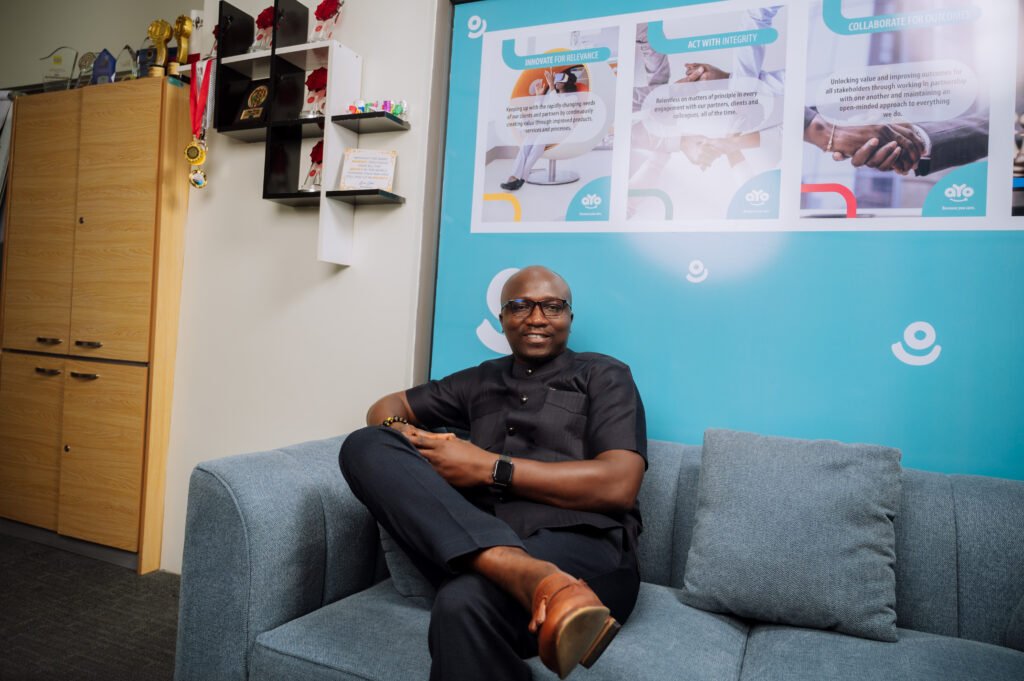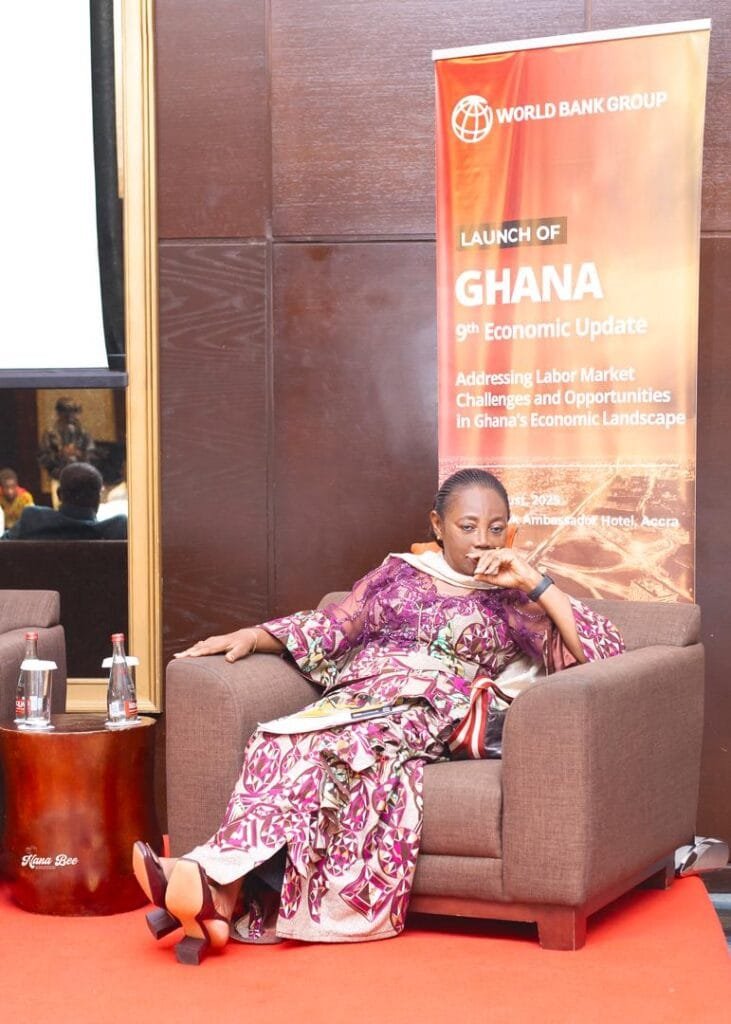The insurtech industry in Ghana is rapidly revolutionizing the insurance market– driven by digital innovation and a commitment to financial inclusion. At the forefront of this revolution is Francis Gota, the CEO of aYo Ghana, whose ingenuity is redefining how insurance is accessed and utilized. Through cutting-edge technology, mobile integration, and customer-centric solutions, aYo Ghana has emerged as a game-changer, bridging the insurance gap and making coverage more accessible to millions of Ghanaians.
Since its inception in 2017, aYo Ghana has leveraged mobile money and airtime deductions to deliver seamless, affordable, and flexible microinsurance solutions. Under the leadership of Francis Gota, one of Ghana’s emerging business leaders, the company has insured a huge chunk of the populace, proving that insurance can be simple, convenient, and embedded into everyday financial transactions. By eliminating traditional barriers such as paperwork and upfront payments, aYo Ghana has empowered individuals and families to protect themselves against unforeseen risks with ease.
Reflecting on his journey with The Vaultz Africa, the CEO of aYo Ghana highlighted his background, shedding insight into the inspiration behind aYo Ghana.
“My name is Francis Gota, CEO of aYo Ghana, and I am passionate about leveraging technology to revolutionize the insurance landscape in Ghana and beyond. With a background in actuarial science, financial services, risk management, and technology-driven solutions, I have dedicated over a decade of my career to bridging the gap between traditional insurance models and the evolving needs of today’s digital consumers and the informal sector.”
aYo Ghana has insured over 8.5 million lives, contributing to expanding financial inclusion. Through microinsurance solutions, the company enables individuals and families to safeguard against financial risks with seamless, convenient coverage.
The young and innovative leader is dedicated to driving thought leadership, industry advocacy, and Insurtech advancements in Ghana. He envisions a future where customer-centric experiences, digital accessibility, and technology-driven solutions redefine insurance, making it more inclusive and accessible for all.

Digital Platforms at the Core of Ghana’s Insurance Industry Transformation
Mr. Gota disclosed that over the past decade, Ghana’s insurance industry has transitioned from paper-based models to digital-first, customer-centric solutions. Regulatory advancements by the National Insurance Commission (NIC), including the Insurance Act 2021 (Act 1061) and digital adoption initiatives like BIMA Lab, have modernized the sector.
Additionally, Ghana’s high mobile penetration, with over 40 million connections, has driven financial inclusion and insurance accessibility. These developments have enhanced proactive claims settlement and improved overall industry efficiency.
“Traditional insurance had a reputation for being complex and inaccessible, but the industry is now shifting towards on-demand, flexible, and user-friendly insurance solutions, particularly through mobile money and digital platforms. Companies like aYo have led the way in leveraging data analytics, and automation to create insurance products that meet the unique needs of the mass market. These changes have not only improved insurance penetration but also enhanced trust and accessibility, creating a more inclusive financial ecosystem.”
The aYo CEO highlighted the rapid evolution of the Insurtech space, noting some exciting developments in insurtech today, and key developments. Embedded insurance integrates seamlessly into mobile money, e-commerce, and ride-hailing services, enhancing accessibility.
The shrewd insurtech personality explained that usage-based and on-demand insurance offer flexible, pay-as-you-go models like aYo Pay & Drive. AI-driven personalization enables dynamic pricing and automated claims processing, improving efficiency. Additionally, blockchain and smart contracts enhance transparency, fraud prevention, and claims automation, reducing costs and streamlining operations in the insurance industry.
Mr. Gota identified key trends poised to disrupt Ghana’s insurance industry. He highlighted microinsurance and financial inclusion, driven by mobile technology, as crucial for protecting low-income populations. AI-driven claims automation, according to him, will enhance efficiency, reduce fraud, and improve customer satisfaction.
Additionally, strategic partnerships between banks, mobile operators, and insurers will expand digital insurance adoption. “At aYo, we are leading these innovations, simplifying and scaling insurance solutions to meet modern customer needs in an increasingly digital world.”
aYo Revolutionizes Health and Life Insurance
The insurtech whiz asserted that aYo has redefined insurance accessibility in Ghana by offering affordable, convenient, and fully digital microinsurance solutions. The company’s model seamlessly integrates insurance into everyday mobile transactions, allowing customers to subscribe through airtime deductions or MoMo-based payments.
With the Recharge with Care option, customers receive insurance coverage whenever they top up their mobile credit. Additionally, MoMo-based deductions enable policyholders to access protection when they send money via MoMo, through aYo Send with Care, or buy other aYo insurance products like Family Cover and Pay & Drive motor insurance through the MoMo app or USSD.
This innovative approach eliminates traditional barriers to insurance adoption, such as paperwork, upfront payments, and complex underwriting processes. By simplifying the process and leveraging mobile technology, aYo has made insurance accessible to millions of previously uninsured Ghanaians.

Inspiration Behind aYo’s Insurance Redefinition
The company’s pioneer revealed the inspiration behind aYo’s innovative insurance model, stating that the vision was driven by a simple question: “How do we make insurance relevant, accessible, and convenient for the everyday Ghanaian?”
In his quest to answer the question, Mr. Gota identified the ineffectiveness of traditional insurance models in reaching the mass market due to affordability constraints, low awareness, cumbersome enrollment and claim processes. Recognizing these barriers, aYo sought to redefine insurance by leveraging mobile technology to bridge the gap between insurers and the underserved population.
By integrating health and life insurance with mobile technology, aYo developed a model that is both practical and user-friendly. The approach eliminates the need for bank accounts or in-person paperwork, making the process seamless. Additionally, the model is affordable, allowing customers to make small, flexible contributions through airtime or Mobile Money (MoMo).
Most importantly, aYo ensures that claims processing and payment are timely, providing customers with immediate access to financial support when they need it most.
“This innovation aligns with our mission to protect more lives and improve financial resilience, ensuring that insurance is no longer seen as a luxury but as an everyday necessity for everyone.”
According to Mr. Gota, the digitization of insurance is not just a trend, it’s the future of the industry. As such, “At aYo, we see digital transformation as an opportunity to bridge the protection gap, ensuring that more Ghanaians can access insurance without traditional barriers”.
The insurtech specialist disclosed that key digital trends shaping the industry include mobile integration, which makes insurance on-demand, flexible, and user-friendly; AI and automation, which enhance customer service and streamline claims processing; and data and analytics, which improve risk assessment, enable personalized policies, and enhance transparency while preventing fraud.
As insurance becomes more embedded into digital financial services, it will drive greater inclusivity, ensuring that more people have access to essential financial protection.
aYo’s Simplification Strategy
The CEO emphasized that the company’s innovation lies in making insurance simple and relatable for the average Ghanaian. He disclosed that aYo has removed traditional barriers by eliminating paperwork, allowing customers to subscribe easily via USSD or mobile apps.
Instead of requiring lump-sum premium payments, the company offers flexible payment options where customers can contribute small amounts through airtime or Mobile Money (MoMo) deductions. This approach ensures that insurance remains affordable and accessible to a wider audience.
Furthermore, aYo has streamlined the claims process to provide timely payouts via MoMo, ensuring real-time financial relief for policyholders. The model’s wide accessibility means that anyone with a mobile phone can enroll without needing a bank account or visiting an office. By removing these complexities, aYo has successfully demystified insurance and built trust among Ghanaians, leading to the coverage of over 8.5 million insured lives.
Partnership, Requisite for Growth
Mr. Gota, one of Ghana’s budding business elites, revealed that aYo’s journey provides valuable lessons for other Insurtech companies looking to thrive in the digital insurance space. One of the most critical takeaways, according to him, is that partnerships drive scale. By collaborating with mobile network operators, banks, and fintech companies, Insurtech firms can accelerate the adoption and distribution of their services, he revealed.
Additionally, the CEO stated that simplifying insurance processes makes policies easier to understand and access, leading to higher adoption rates. Trust also plays a crucial role, as transparent claims processing and customer education help build confidence in digital insurance solutions, he emphasized.
Furthermore, Mr. Gota revealed that technology is a powerful tool for financial inclusion, as mobile-driven solutions eliminate traditional barriers and expand coverage to underserved populations.
Moreover, adaptability is essential for long-term success, with Insurtech companies needing to evolve by integrating emerging technologies such as artificial intelligence, blockchain, and embedded insurance solutions, he asserted. “At aYo, we remain committed to revolutionizing insurance, ensuring that every Ghanaian, regardless of income level, has access to financial protection.”
Challenges Confronting Ghana’s Insurtech Industry
Mr. Gota, a leader in the insurtech industry, noted that while the industry is developing, it faces several challenges that limit its ability to expand and reach its full potential. One major issue he opined is the low level of insurance awareness and trust among Ghanaians. Many people, according to him, see insurance as complicated, expensive, or unnecessary, which has resulted in low adoption rates. Additionally, past incidents of delayed or denied claims have weakened public confidence in the industry, making it difficult for Insurtech companies to gain trust.
Another significant challenge, he noted, is the regulatory and compliance barriers that Insurtech firms must navigate. The rules governing digital financial services are constantly evolving, making it difficult for companies to keep up.
Licensing requirements, data protection laws, and other regulatory policies can slow down the development and launch of new insurance products, he revealed.
Limited Digital & Financial Inclusion is one of the challenges facing the Insurtech industry. A significant portion of the population still operates in a cash-based, informal economy with limited digital literacy. This makes it harder to introduce fully digital insurance solutions to certain customer segments.
“Also, Fraud & Data Security remains another concern. The increase in digital transactions has also exposed the industry to fraud risks, identity theft, and cyber threats, necessitating robust security measures. While mobile money adoption is high, integrating digital insurance solutions across multiple financial and telecom platforms remain a challenge due to system fragmentation.”
These factors create hurdles for innovation and make it harder for Insurtech companies to offer seamless and accessible insurance solutions to the public.
Strategies to Accelerate Insurtech Adoption
The astute CEO highlighted key strategies to unlock the potential of Insurtech and promote financial inclusion, starting with customer education and awareness. He emphasized the need for nationwide campaigns to demystify insurance, using digital storytelling in local dialects to make it more relatable.
Additionally, he called for transparent claims processes to rebuild trust in the industry. He also stressed the importance of regulatory engagement, urging collaboration with the National Insurance Commission (NIC) to develop policies that support digital insurance models, while commending the NIC’s efforts in introducing regulatory sandboxes for testing innovations.
He further underscored the role of strategic partnerships with mobile network operators (MNOs), fintech firms, and banks in ensuring seamless digital insurance distribution. Strengthening Application Programming Interface (API) integrations would enhance interoperability between digital wallets, insurance platforms, and financial institutions. Security was another priority, as he advocated for AI-driven fraud detection tools and stronger cybersecurity measures to protect customer data, ensuring a secure and fraud-resistant system that fosters trust and wider adoption of digital insurance.
Finally, Mr. Gota emphasized the need for tailored insurance solutions for the informal sector, which makes up a significant portion of the economy. He recommended low-cost microinsurance products aligned with informal workers’ income patterns and flexible payment models like “pay-as-you-go” insurance linked to mobile transactions. He also proposed AI-powered chatbots and USSD-based sign-ups to improve accessibility for customers with low digital literacy.

Shaping the Future: Leadership for Ghana’s Digital Economy
The budding business elite emphasized that to accelerate Ghana’s economic growth in the digital era, emerging leaders must prioritize innovation, inclusion, and agility. He urged leaders to embrace digital transformation as the backbone of economic progress rather than just a support function.
He suggested that leaders must leverage big data for decision-making, create localized solutions tailored to Ghana’s unique market, and foster collaboration between fintechs, regulators, and traditional businesses. Additionally, he stressed the importance of promoting financial and digital inclusion by developing tech-driven solutions for the informal economy and supporting STEM education.
To drive Ghana’s digital economy, leaders must develop essential skills such as visionary thinking, adaptability, and tech-savviness, he advised. They need to anticipate trends, encourage continuous learning, and make data-driven decisions rather than relying on intuition. Agility and risk-taking are also crucial, as the digital economy thrives on innovation and the ability to pivot quickly. Moreover, strategic partnerships with startups, government agencies, and financial institutions will be vital in building a thriving digital ecosystem.
Mr. Gota also highlighted the need for people-centric leadership, where talent development, mentorship, and upskilling programs are prioritized. Digital transformation must be inclusive, benefiting both urban and rural communities, he recommended.
Government’s Role in Empowering Ghana’s Insurtech Industry
Considering government’s role in driving insurtech growth and positioning Ghana as a digital insurance leader in Africa, Mr. Gota called for a forward-thinking regulatory framework that encourages innovation, while ensuring consumer protection. Regulatory sandboxes would allow Insurtech startups to test new products with minimal barriers, while stronger collaboration between regulators, insurers, and fintechs would help create balanced policies that support digital expansion.
Strengthening digital infrastructure is also essential, particularly by expanding mobile and internet penetration to facilitate digital insurance adoption, especially in rural areas. Integrating insurance with the Ghana Card and mobile money platforms would streamline onboarding, while investments in cybersecurity would enhance data protection and fraud prevention.
aYo Ghana’s CEO further highlighted the need for financial and digital inclusion, urging nationwide public education campaigns to build trust in digital insurance solutions. Tailored microinsurance policies, according to him, should be developed to serve informal workers and underserved communities.
He also encouraged the government to strengthen regional collaborations by positioning Ghana as a digital insurance hub and harmonizing regulations with other African markets to expand Insurtech solutions across the continent.
By adopting proactive policies, the government can unlock Insurtech’s full potential, increase insurance penetration, and establish Ghana as a leading hub for digital insurance innovation in Africa.”
Mr. Gota, one of the personalities charting the next business front, highlighting key trends to shape the future of Ghana’s Insurtech industry, revealed AI-driven personalization for tailored microinsurance, embedded insurance through mobile money and e-commerce platforms, and blockchain technology to enhance transparency and fraud detection. He also noted a shift toward pay-as-you-go and usage-based insurance models, making coverage more accessible.
Transforming Ghana into Africa’s Insurance Hub
Mr. Francis Gota, the undisputed leader in the insurtech industry, emphasized the need for customer education, urging companies to simplify insurance concepts and offer transparent, easy-to-understand products to build trust. Additionally, he highlighted the importance of investing in technology and cybersecurity, as secure and scalable platforms will be crucial for gaining user confidence and ensuring long-term growth.
The aYo Ghana CEO also encouraged Insurtech firms to actively engage with regulators to co-create policies that foster innovation while maintaining consumer protection. Furthermore, he stressed the need for scalability, urging companies to design affordable and flexible insurance solutions that can be expanded regionally across Africa.
In conclusion, he noted “The future of Insurtech in Ghana is bright and full of possibilities. By combining innovation, collaboration, and regulatory support, the industry can drive greater insurance penetration, financial inclusion, and economic resilience. Insurtech is not just about technology; it’s about transforming lives by providing security and stability to millions.”









